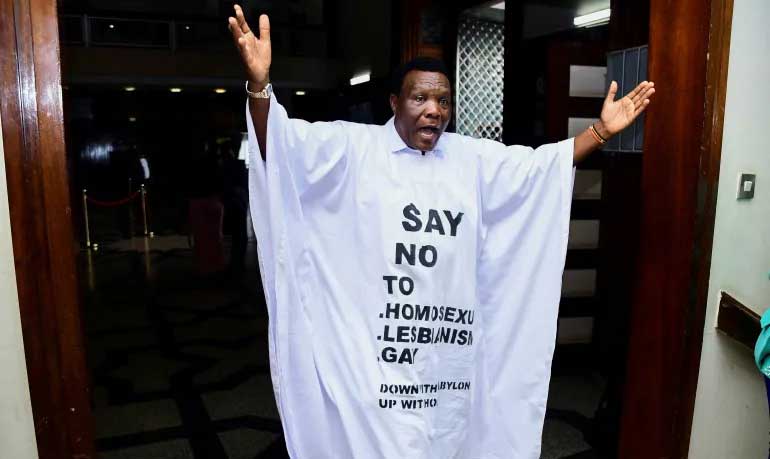News
Anti-Homo bill triggers huge international backlash

Ugandan Member of Parliament John Musira dressed in an antigay gown during debate of the Anti-Homosexuality bill
The speedy passage of the Anti-homosexuality bill by the Parliament of Uganda has sparked a huge backlash from the international community, but many Ugandans have vowed to contend with the negative repercussions from the fallout arising from the legislation.
On Tuesday March 21, Parliament almost unanimously passed the Anti-Homosexuality Bill 2023 with penalties including a 20-year prison term for anyone convicted of engaging in acts of homosexuality as well as a death penalty for aggravated homosexuality.
The proposed law categorized aggravated homosexuality as the penetrating the anus of a person with a sexual object if the victim is aged below 14 or above 75, has a physical or mental disability, or has contracted through the sexual act an illness that has no scientific cure. The death penalty will also be applicable if the accused is a parent, guardian, or serial offender.
But the law has cast Uganda into perhaps unintended negative spotlight on the international scene, including calls by the US government to Ugandan authorities to reject the bill.
The US Secretary of State Anthony Blinken said that the new bill threatens to undermine the rights of all Ugandans and is likely to endanger the fight against HIV/AIDS.
Blinken said through his official twitter account that: “The Anti-Homosexuality Act passed by the Ugandan Parliament would undermine fundamental human rights of all Ugandans and could reverse gains in the fight against HIV/AIDS. We urge the Ugandan Government to strongly reconsider the implementation of this legislation.”
The U.S government donates hundreds of millions of dollars in the fight against HIV/AIDS in Uganda.
The passage of the law has also been a top story for the BBC, the Guardian, VOA News, Al Jazeera among many others, which has focused their attention on the tough penalties in the law.
Several international human rights and health agencies have also issued strong statements, asking President Museveni to reject the proposal.
The International AIDS Society also said the proposed law threatens to endanger the fight against the disease.
IAS issued a statement saying: “This legislation will only reinforce stigma and discrimination against the LGBTQ+ community and hamper progress on ensuring safe access to health services.
“Criminalizing LGBTQ+ people is wholly incompatible with an effective HIV response. While Uganda has made considerable gains in reducing the impact of HIV, gay men and other men who have sex with men, trans people and sex workers continue to be less likely than the general population to access HIV treatment, prevention and care services and will be further threatened by this legislation.”
Human Rights Watch, an American-based rights observer group asked President Yoweri Museveni not to sign the law.
Museveni should reject the bill and Parliament should introduce comprehensive nondiscrimination legislation that would protect sexual and other minorities in line with Uganda’s international obligations.”
The Private Member’s Bill was introduced by Bugiri Municipality Member of Parliament, Asuman Basalirwa, attracted cross-party support as 389 MPs voted in favour of the measure while only two opposed it.
The international condemnation arising from passage of the bill, coupled with the recent cabinet position that Uganda has adequate laws on homosexuality, have cast doubt on chances of having the new law signed by President Museveni.
An earlier effort to pass the Anti-Homosexuality Bill 2014 which was dubbed as the Bahati bill, failed when the Constitutional Court ruled that it was passed wrongly on procedural grounds.
Nontheless, the bill enjoys a lot of support from across the Ugandan population.
Comments


















